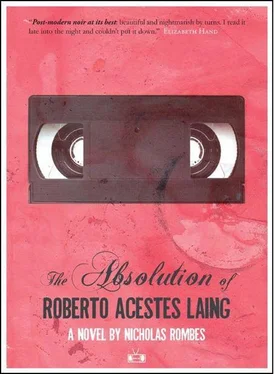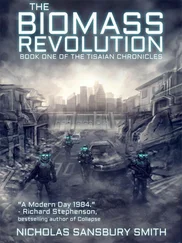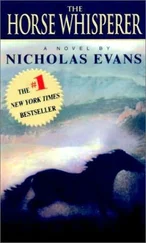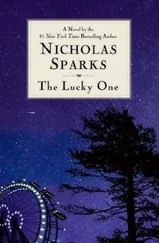HIM: “Swaying?”
HER: “It could have been. I think it was. My head was spinning.”
HIM: “What did you do?”
HER: “Nothing. I couldn’t tell what it was. It was this ( sound cuts out ) presence, you know? Like God’s eye but not God. Or a statue of God. That’s what I keep thinking now, a statue of God. I slowly backed up and ( sound goes ) could hear the voices of the others back at the jeep. I heard it start and I thought they were going to ( alien-sounding word; ‘gadorigean’? ) without me. I ran to them in the dark.”
HIM: “And then what.”
HER: “Nothing else happened. But the ( screeching sound; camera vibrates ) in the church, it saw me, it recognized me. What if I told you that it’s searching for me?”
HIM: “That would be nice.”
HER: “What would?”
HIM: “To be hunted.”
HER: ( film gets grainy here ) “What makes you say that?”
HIM: “I’m just kidding.”
HER: “Don’t kid because ( sudden droning sound drowns out dialog ) and like it saw right through me and knows everything now. Even things that haven’t happened yet.”
HIM: “Sounds like mythology.”
HER: “Well it’s a story, at least. That’s what you ( drone sound ). But it really happened. It’s a story that’s true. You better watch out. You’re the only one I’ve told it to.” She laughs.
This seems to Haydn ( the screen goes blank or black here) like some sort of threat or promise, or maybe even a little bit like an invitation. She touches his hand gently when she says it. Why she does this he can’t fathom; what she wants from him he does not know. He lets her keep her hand on his for a few moments, before withdrawing it and standing up. Whatever it is that she wants he does not have to give, although her cryptic talk makes sense to him in a strange way. As he listens to her, he thinks that maybe she reminds him of his wife or daughter. But she doesn’t. She is just some girl, some person. She smiles, and there is something beneath her smile, something that Haydn thinks he understands.
Then everything changes again so quickly. ( Like the accident? ) Late into the night he awakes on the couch to the smell of what he first thinks is burning popcorn. ( Only became clear during third viewing. ) In the semi-light he stands up and pulls on his pants and sweatshirt, his eyes watering, coughing, and for a moment, inexplicably, he thinks he needs to save his daughter. ( Not conveyed directly on screen but somehow this is the feeling we get as the audience, the feeling of Haydn’s thoughts. ) Then he remembers and calls for the girl, as if he had always known her, but there are flames coming from the kitchen that stand between where he is and the bedroom. The heat pushes him back, and out of the cabin, and he finds his way in the dark to the front door, and then down the steps, ( the camera moves with remarkable grace during this sequence ) across the street, and to his car, and he doesn’t look back, and for a moment, in his alarmed grogginess, he believes that Hell itself is coming for him in the flames. He gets in his car and drives off, passing the screaming fire truck coming the other way.
What will they find back there?
Her body, charred in his bed?
Or perhaps not, perhaps she was bad, and had started the fire herself, had waited until he was asleep on the couch, had tiptoed around and looked at his face one last time. It’s strange to be driving without direction or purpose, but he was. Clutching the steering wheel, he drives for hours into the night down through the northern Michigan openness toward Detroit, which looms 200 miles in the future like an abandoned set from a dystopian science fiction film. ( This is conveyed in a non-representational way, not from images in the film but from the soundtrack, a song that’s playing while Haydn’s driving. ) Every time he drives through Detroit it looks and feels worse than the time before. It’s “an experiment in suicide.” At 1 a.m. he pulls off into a welcome center and sleeps on the leaned-back seat.
He starts up again at about 4 a.m. About an hour later, he can see the dawn creeping up in his rearview mirror, illuminating the flat, scrubby fields. It’s June; “why isn’t anything growing in them?” It doesn’t matter.
The truth is, Haydn could travel like this forever ( this part’s voiced over ) through the unpoliced towns that dot the Midwest, the freedom of its unkempt highways, its unexplored woods, its abandoned barns, its empty buildings from another era of physical labor. It’s as if the real world has been abandoned to him alone. There is no war. There are no Towers. There is nothing virtual. He moves across the landscape unnoticed. Despite everything that has happened he is Godlike in his assuredness. He ambles vacantly through the vacant city and it’s as if he’s watching himself in a movie ( conveyed through something that approximates a split screen; a screen-within-a screen or layered on top of the screen ) that’s supposed to be frightening but that comes across as absurd, absurd in the old existential sense where the blasted, blank landscapes are there for a reason, a real fucking reason. He finds himself at The Fist, oh yes, Mr. Joe Lewis, the 8,000 pound fist that knocked out the Nazi puppet boxer Max Schmeling at Yankee Stadium on a hot day in 1938 in front of J. Edgar Hoover and Clark Gable, and the same fist that would be extended to an open hand, the open hand of a man who would befriend Schmeling in later years.
In his car, driving out of the ruined city, the rain pounds his windshield in the night. Buildings and bridges disappear behind him, fleeing into the distance of his rearview mirror. Lightning fills the passageways of abandoned buildings and the underpasses of great highways. ( And yet I recall this being depicted as lightning flashes coming from within the car itself. ) On a sharp curve on I-94 he passes a night-time road construction crew, illuminated in the lightning like some three-dimensional painting, their yellow hats, their orange vests meant to protect them from swerving cars. They’re carving out the rib-caged underside of an overpass. He drives further south out of Detroit with its savage history written everywhere, the car radio playing a crackly version of a new White Stripes song that already sounds ages old.
He takes Telegraph Road laid out like the barrel of a gun through the suburbs past Dearborn and eventually into the dark countryside past Adrian and into the little town of Monroe, with its sad middle-of-the-night flashing red stop lights, the rain coming down in heaves like something from an over-budgeted movie.
Haydn slows at an intersection as a shadow speeds across the road, then stops. A bony dog stands at the side of the road in the pale edges of his headlights and Haydn reaches over and behind him and opens the door and waves a half-eaten candy bar beneath the dome light. In the backseat, the animal holds the candy between its paws and chews at it silently.
He drives on out of Monroe south into the unfamiliar Michigan countryside, his window open to the sound of crickets in the fields.
Farther south still ( the film goes silent for several minutes beginning here) to the Ohio border. At the Red Roof Inn at midnight, he pays in cash and carries the lame dog bundled in his coat up the dimly lit, cracked cement stairs, to room 218.
Everything looks fake, like props.
The bed.
The TV.
The walls.
He kicks at the tiny table to make sure it’s not painted cardboard.
He puts the dog on the bed, turns on the lights, and shuts the door.
In the shower, he rubs the little odorless white bar over his face and in his hair.
Читать дальше












![Nicholas Timmins - The Five Giants [New Edition] - A Biography of the Welfare State](/books/701739/nicholas-timmins-the-five-giants-new-edition-a-thumb.webp)